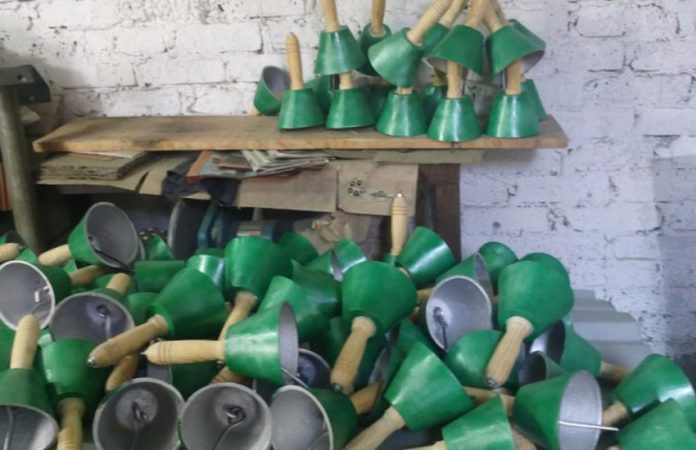As I’ve written before, Mexico is a very noisy country. And at least in urban settings, it’s not conducive to that loveliest of institutions, the siesta.
But no matter! All that noise is just something to be expected down here, and since I’ve been feeling charmingly perplexed — a state of mind I don’t always manage to find — by what seems like even more noise lately, I’d like to dedicate this week’s piece to examining what exactly some of those noises are.
What might be the source of these noises, you may ask? For the sake of efficiency, I’ve decided to divvy them up into categories (yes, there are enough to make categories).
Services
For the entire first year that I lived in Xalapa, I was completely bewildered by the frequency with which I heard a certain song blaring through the neighborhood on a vehicle as it raced by. “What the hell is that?” I’d ask my compatriots (to be fair, those were the wrong people to ask). The answer was finally revealed to me one day when I heard it and then saw my host-mom run to the front window to wave down the source of the music.
If I’d been able to decipher the lyrics with my fledgling understanding of Spanish, I’d have figured it out earlier: “¡Ya llegó Gas Express!/¡Gas Expess ya está aqui!” (“Gas Express arrived!/Gas Express is here!”). Gas delivery!
In my defense, it doesn’t occur to most North American foreigners that LP gas is something that must be delivered by a company rather than pumped through pipes or wires magically like water or electricity. But by far, it was the greatest mystery to me for the better part of a year.
Another sound that you might hear, at least where I live in Xalapa, is a cowbell. That’s right, a cowbell!
The role of the cowbell, which is rung by a person literally running up and down the street, is to let people know that it’s time to take their trash out to the designated area for pick-up roughly 10 minutes later.
If you miss the cowbell and trash pickup only happens once or twice a week (as it does in my neighborhood), then you might be able to catch a few independent trash collectors who walk through the neighborhood shouting “Quiere basuraaaaaa” (literally, “want traaaaaash”). Walk out of your house and wave them down! You can give them your trash bags for a few pesos.
Finally, there’s a high-pitched whistle used by the person who rides around offering to sharpen your knives. It’s almost like a train whistle but much airier and higher. So, if you hear it and have some dull edges, wave him down and take your knives out!
Things for sale
This is also a big category, and the biggest part of it by far is food. The way to tell what exactly is for sale is, of course, to sharpen your listening skills or take a peek outside as they’re passing. Most people can understand tamales, but camotes (sweet potatoes), elotes (corn with mayo, cheese, and chile pepper), verduras (vegetables) and pan (bread) might get past some people if they’re not used to it.
Sometimes there’s a recording that blares out of speakers affixed to the top of a car, but often the vendors have simply sharpened and perfected their loud calls to announce their presence in your neighborhood.
Agua (water) is another word that gets announced on my street a couple times a week. They’re not talking about water from the faucet, but rather garrafones of water, those five-gallon clear containers of purified drinking water. This is what most people drink from in their homes, as the water from the tap is officially suspect for regular consumption. (I once asked a chemist friend who worked at a water plant about that, and she explained to me that the water wasn’t so much the problem, but rather the outdated pipes that it ran through).
Another frequent noise that I think is more about buying than selling is for fierro viejo (old iron literally, but mostly they mean any kind of old large appliances that don’t work anymore and that you’d like taken off of your hands). They’ll “buy” it from you, though I’m not quite sure for how much.
Miscellaneous
The first thing to go under this category is animals, of course: barking dogs, of which there are sometimes many, top the list. After that — at least in cities like mine whose pueblo’s past isn’t too far removed from the present day — are … roosters!
In the farm animal children’s books of my youth, roosters only crowed at sunrise. Not so in my neighborhood! Roosters (apparently) crow to establish dominance and territory, the habit more closely resembling dog barks than a once-daily sunrise ritual.
There are roosters on my street that crow at me every time I walk by … perhaps my gait looks like a threatening strut? They are not persuaded of my intentions by my repeated “Relax, dudes,” so it’s just something I’ve come to expect. I think I’ll start telling myself that they’re just saying hi.
This is not a complete list by any means: there are rockets and fireworks on pretty much any saint’s day, and when we hear them, we pray that they actually are rockets and not bullets. Partying neighbors (complete with old songs sung in unison by 20 very drunk people at 2 a.m.) are also a common occurrence.
The general attitude seems to be that noise is simply something everyone makes and therefore something everyone has to live with. You can always tune out the sounds with a good pair of headphones, but why try?
Sarah DeVries is a writer and translator based in Xalapa, Veracruz. She can be reached through her website, sdevrieswritingandtranslating.com and her Patreon page.
